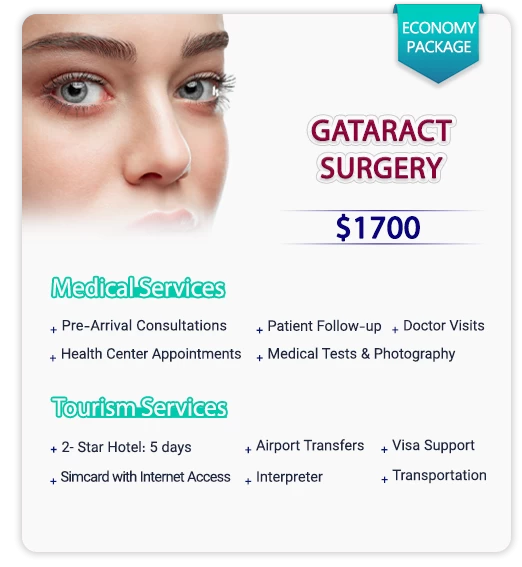A cataract refers to a cloudy area on the eye's natural lens. This disease, the most common cause of impaired vision in people over 40 years of age, can interfere with daily activities such as reading, driving, and exercising. Hence, it is crucial to treat cataracts in time.
What Is Cataract?
You may have cataracts if you are over 40 years old and your vision is blurred. In cataracts, the lens of the eye, which is usually clear and transparent, becomes cloudy and opaque due to the accumulation of proteins on it. Usually, cataract happens due to congenital reasons, trauma, the use of certain drugs, exposure to toxins or radiations, diabetes, and most importantly, aging.
The good news is that not everyone with a cataract necessarily needs cataract surgery. Cataracts in their early stages may cause only minor problems such as myopia. However, you will need to undergo cataract surgery if your vision problem cannot be corrected with glasses or contact lenses. Cataract surgery involves removing the eye's natural lens and replacing it with an artificial one.
The 4 Different Types of Cataracts
There are four types of cataracts; nuclear, cortical, congenital, and posterior subcapsular.
A nuclear cataract is the most common type that damages the eye's central part. The nuclear cataract at first causes myopia, but the vision gets blurred and cloudy as time passes.
Cortical cataract: this type of cataract starts from the lens's edges and moves toward its center. Cortical cataract mainly happens to people with diabetes and hypertension.
Congenital cataract: some children are born with a cataract. The reasons for this type of cataract can be intrauterine infection, trauma during the pregnancy, galactosemia, etc.
Posterior subcapsular cataract (PSC): this type of cataract is a bit more complex than the other types. It starts from the back of the lens and decreases the vision gradually. Fortunately, PSC can also be treated, and the patient can return to everyday life three months after the cataract surgery.
Why Iran for Cataract Surgery?
Cataract surgery is considered a delicate operation, so it requires accurate surgical devices as well as the high knowledge of a professional ophthalmic surgeon. In Iran, cataract surgery is done in modern hospitals equipped with the latest surgical instruments. Fortunately, the success rate of lens replacement surgery in Iran is %98, which makes the country a desirable destination for patients who need this operation. Moreover, the cost of cataract surgery in Iran is almost one-third of the cost in the U.S and Europe.
Cataract Surgery Cost in Iran
The cost of cataract surgery in Iran depends on five factors; the surgeon's knowledge and experience, the surgery's method, the facilities of the hospital or eye clinic, the complexity of the surgery, and the condition of the damaged eye. Usually, the cost of this surgery in Iran starts from $500 per eye, while in the U.S., it starts from $1.500 per eye.
Types of Cataract Surgery in Iran
In cataract surgery, the damaged part of the lens is removed from the eye, and an intraocular lens is in place. The surgery is usually performed under local anesthesia and takes about 20 minutes.
In Iran, three types of cataract surgery are practiced; phacoemulsification or phaco, extracapsular, and intracapsular.
Phacoemulsification
Phacoemulsification is the most common type of cataract surgery through which an incision is made around the edge of the cornea. Then the cloudy lens is shattered and removed from the eye using sound waves. Finally, an artificial lens is implanted, and the incision site is sutured when the damaged lens has been removed.
Extracapsular cataract surgery
In this method, the damaged lens should not get shattered; it has to be removed as a whole. So, a larger incision is made on the edge of the cornea. Since it is a rather complex operation, the anesthesia is administered through injections around the eye.
Intracapsular cataract surgery
In Intracapsular cataract surgery, an even bigger incision is made on the cornea, and the lens and the surrounding lens capsule are removed all at once. Since this cataract surgery has more complications, it is performed less often nowadays.
What to Expect after Cataract Surgery?
After cataract surgery, your eyes may be itchy, sticky, painful, and sensitive to light. Moreover, you probably tear much more than normal and feel nauseous due to dizziness. Although your vision is blurry for the first few days, it improves as you apply your prescribed eye drops. You may also be asked to wear eye shields for a week, especially during sleep, to protect your eyes from pollution and injury. Keep in mind that the results of cataract surgery are not immediate, and it takes 5 to 10 days for your eyes to see as clear as before.
Who Can Do Lens Replacement Surgery?
Cataracts occur not only in the elderly but also in young people. Trauma, certain medications, and genetic conditions can lead to cataracts even at a young age. So, patients with blurry vision or difficulty reading, driving at night, and looking at screens can undergo lens replacement surgery, no matter what age they are.
Best Cataract Surgeons in Iran
Choosing a good cataract surgeon has an effective role in the operation's outcome and in reducing postoperative complications. Luckily, Iran has the best eye surgeons worldwide who have graduated from top medical universities in Iran and other countries. Iranian eye surgeons first consider the patient's physical and mental conditions, then choose the best methods of anesthesia and surgery for the patient. As a result, you can rely on the experience and knowledge of cataract surgeons in Iran and enjoy the outcome of the surgery.
How to Prepare for Cataract Surgery?
Before undergoing cataract surgery, consider the following tips:
- Take a bath a day before the surgery;
- Have a light breakfast on the day of the operation;
- Ask someone to be your caregiver for a day or two;
- Do not wear makeup or perfume right before the operation;
- Do not drink alcohol or caffeinated beverages for three days before the operation;
- Avoid taking blood thinners such as aspirin from a week before the surgery; and
- Inform your surgeon on your current medications and health problems.
Lens Replacement Surgery Postoperative Care
A day after the lens replacement surgery, you should visit your surgeon for checkup. The doctor will unwrap your bandages and examine your eye with special devices. Most people will regain their eyesight within several days and can restart their daily activities -including going to work- a week after the surgery.
After cataract surgery, follow these guidelines:
- Avoid washing your face, specifically the area around the eye, for three days;
- Do not bend over;
- Avoid driving for a week;
- Do not lift, push, and pull heavy objects;
- Cover your eye with a plastic shield when you are sleeping or leaving the house;
- Do not rub your eyes for a week after the surgery;
- If your eyes become red or you have severe pain after the surgery, contact your surgeon ASAP;
- Prevent dust and dirt from entering the eye; and
- Use eye drops only with the prescription of your doctor.
Possible Complications of Cataract Surgery
Typically, cataract surgery has no severe complications; However, if you have faced any of the following problems, contact your ophthalmologist.
- Severe pain;
- Swelling around the eyes;
- Abnormal eye discharge;
- Distorted vision;
- Ocular hypertension;
- Infection;
- Dislocation of the lens;
- Bleeding;
- Intense light sensitivity; etc.
Frequently Asked Questions About Cataract Surgery in Iran
1) How long after cataract surgery should I stay in Iran?
You must stay in Iran for at least a week after cataract surgery because the doctor should examine your eyes one day and one week after the operation.
2) Is cataract surgery painful?
Generally, cataract surgery is not painful; however, some patients experience mild pain and discomfort in their eyes for a couple of days after the surgery.
3) How long is cataract surgery’s recovery period?
You can do your daily activities almost a week after the surgery, but full recovery will take four weeks.
4) Will cataracts grow back after the surgery?
Fortunately, no. Cataracts cannot grow back on an artificial lens.
5) Can cataract surgery be performed on both eyes in one day?
It is possible to perform cataracts on both eyes in one session; however, most surgeons prefer to operate on the eyes at an interval of two weeks.


comments
No reviews